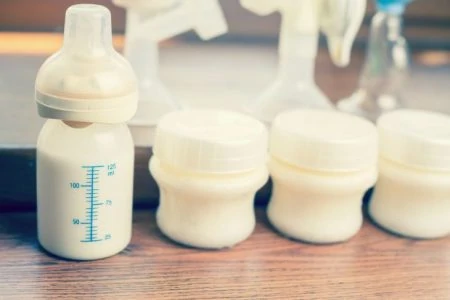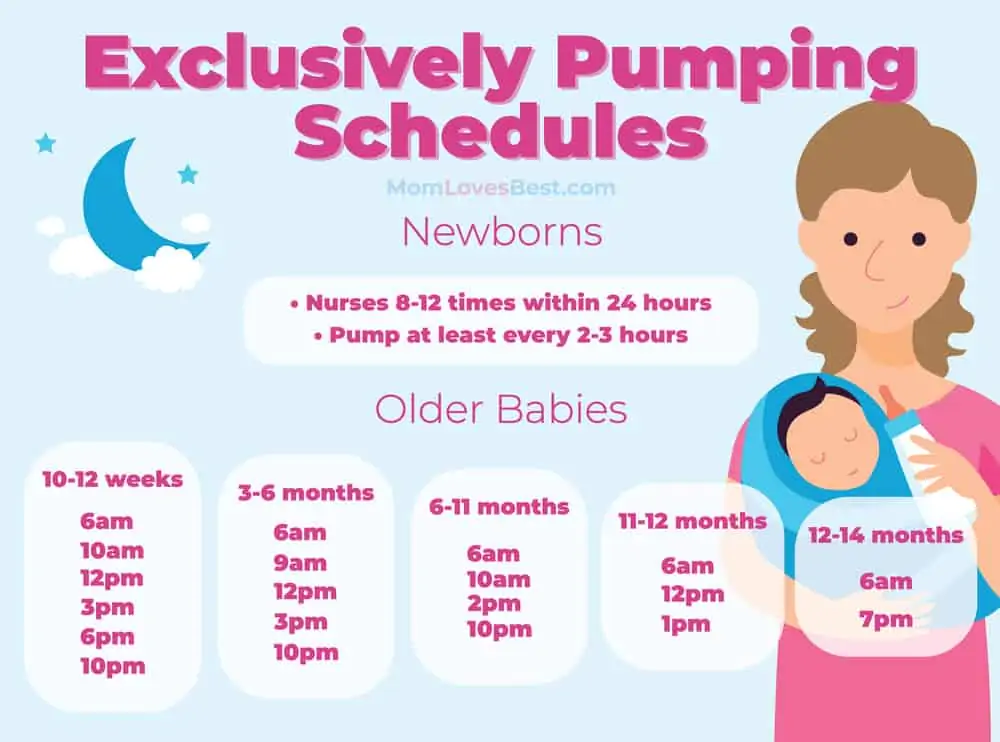If your baby is suddenly sleeping through the night, you probably want to do the same. However, you know that pumping can be essential for maintaining supply and avoiding issues like clogged ducts and mastitis. So, does this mean you need to pump at night?
We want your baby to have their best chance, and we know how you need your sleep. So, we’ve done the research to answer this question for you.
In this post, we will cover how often you should be pumping whether you’re exclusively pumping or not. We’ll also discuss if you need to be pumping at night.
Key Takeaways
- The frequency of pumping depends on whether the baby is exclusively being bottle-fed or not.
- For newborns who are exclusively pumped, pumping should be done at least every two hours, and double pumping for 15-20 minutes during each session is recommended to mimic nursing and establish a good milk supply.
- For older babies who are exclusively pumped, pumping once between 1 a.m. and 4 a.m. is recommended, as it is when most mothers have high milk output.
- As the baby gets older and eats more solid food, the number of pumping sessions can be reduced.
- If you miss a pumping session, it should not harm your supply as long as you can squeeze in another session at a different time of the day.
Exclusively Pumping (Baby Isn’t Nursing)
If you’re solely pumping and bottle feeding, you should be trying to match how often a nursing baby would feed at the breast.
1. For a Newborn
Newborns typically nurse 8-12 times within a 24-hour period. So, pump at least every two hours, and avoid going longer than three hours without pumping until your supply is well established (1).
Pumping whenever your newborn baby eats is the best way to ensure you are mimicking nursing. Some mothers have to pump exclusively for the first week if their baby won’t latch.
Double pump for 15-20 minutes during each pumping session, emptying the breasts as thoroughly as possible. Experts also recommend pumping for two to five minutes after your milk stops flowing to maintain production and help increase supply if needed (2).
Pumping Goals
If you’re exclusively pumping straight out of the hospital, start with eight to ten pumping sessions a day, and then adjust accordingly. If you have a low milk supply, increase the number of pumping sessions. If you have an oversupply, drop a pumping session or two.
2. For Older Babies
It’s a good idea to pump at least once during the night in the first few months or if you start to notice a dip in supply. Many moms and lactation consultants recommend pumping once between 1 a.m. and 4 a.m., as most moms tend to have a high output at this time.
In addition, your prolactin levels are highest at night, so you’re taking advantage of the milk-making hormone by pumping at night.
Editor's Note:
Michelle Roth, BA, IBCLCKeep In Mind
As your baby ages, they eat more per feeding (usually around 3.5-5 ounces) and go longer between sessions. You’ll also need to pump less often once they start eating more solid foods.
Figure out a pumping schedule that works for you and your baby, as everyone’s situation is different. You might find these example pumping schedules useful:
- 10-12 weeks: 6 a.m., 10 a.m., 12 p.m., 3 p.m., 6 p.m., 10 p.m.
- 3-6 months: 6 a.m., 9 a.m., 12 p.m., 3 p.m., 10 p.m.
- 6-11 months: 6 a.m., 10 a.m., 2 p.m., 10 p.m.
- 11-12 months: 6 a.m., 12 p.m., 1 p.m.
- 12-14 months: 6 a.m., 7 p.m.
If You Miss a Night Pumping Session
Sticking to a pumping schedule can be challenging. If you accidentally miss a pumping session now and then, there is no need to fret, as it most likely will not harm your supply — especially if you can squeeze in another session at a different time of the day.
Remember
To Wake or Not To Wake?
Breastfeeding at night is good for supply, but do you need to wake your baby or pump if they sleep through the night?
If your baby is back up to their birth weight, growing fine, doesn’t have any medical issues (such as jaundice), and has plenty of wet and dirty diapers, then there is no need to wake them to feed. Let them sleep, and enjoy some sleep yourself.
There is also no need to pump as breastfeeding is a supply and demand function. If you pump, you’re essentially telling your body to make more milk, and it’s most likely that your baby will want a lot to eat after a long night of sleep. This could potentially lead to an oversupply.
If you’re uncomfortable or engorged in the middle of the night, simply pump or hand express just a little bit of milk for some relief.
FAQs
Pump Or Sleep?
If you are exclusively pumping and bottle feeding your baby, mimic what a breastfeeding baby would be doing. Pumping every time your baby feeds ensures you’re mimicking this relationship and will minimize night pumping.
For a newborn, double pump every two to three hours for 15-20 minutes at a time. As they get older and start eating more per feeding, going longer between feedings, and eating more solid food, you should be able to drop pumping sessions, including those dreadful middle of the night ones.
If your baby is nursing but has recently started sleeping throughout the night, there is no need to get up and pump unless you’re uncomfortable. In that case, pump off just a little for some relief.













